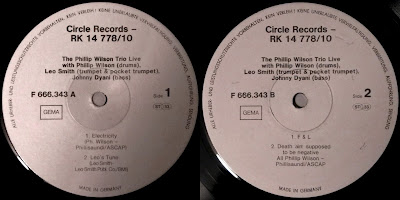Label:
Circle Records – RK 14778/10
Format:
Vinyl, LP / Country: Germany / Released: 1978
Style:
Free Jazz, Free Improvisation
Recorded live at
the Northsea-Festival in Den Haag, July 14, 1978, Holland
Design,
Photography By [Back Cover] – Rudolf Kreis
Photography
By [Front Cover] – Günter Voss
Recorded,
Producer By – Rudolf Kreis
Published
By – Phillisaundi / Leo Smith Publ. Co.
Matrix
/ Runout (Side A): F 666 343 A 1
Matrix
/ Runout (Side B): F 666 343 B 1
A1 - Electricity .....................................................................................
11:20
A2
- Leo's Tune ...................................................................................
10:21
B1
- F & L
............................................................................................
14:04
B2
- Death Aint Supposed To Be Negative ..........................................
9:45
Phillip
Wilson – drums
Leo
Smith – trumpet, pocket trumpet
Johnny
Dyani – bass
Wilson assembled the
trio featuring Smith and Dyani for a performance at the Northsea Jazz Festival
in Den Haag. The performance was on July 14, 1978. The record was produced by
Rudolf Kreis for Circle Records, a small German label that recorded mostly
progressive jazz from 1977 to the mid 1980s.
“Electricity”
starts the set off at a clip, the drummer setting the pace. Dyani’s fast
pizzicato plucks go up and down the fret board as Wilson’s light hi-hats keep
the momentum. Smith’s strong vibrato-less tone fills the melodic role as the
piece pushes on. The bass is high in the mix and Dyani takes advantage as he
really wrestles tones out. The dialog between Smith and Dyani is intriguing.
The call and response sections are of interest as the two develop an
interesting dialog.
This
is pure energy music with a free pulse allowing the musicians to really invest
in their own sound. Smith keeps the energy up and texture dense with thick
swathes of sound. The communication is good. Wilson plays the accompanist role
until the middle where he commands a solo that starts at mid intensity and
builds, rollicking along. Dyani returns with a solo letting the harmonics ring
from his instrument with runs through the registers. It isn’t about intonation
and melodicism as much as it is about sound creation, rhythm and texture.
Smith
joins back with a blustery tone. The last couple minutes are interesting for
the gear shifts, each soloist gets a chance to drive. The bass begins to walk,
steering toward the conclusion, then slows with loud twangs as Smith ends with
a long tone and Wilson’s cymbal splash.
“Leo’s
Tune” is a melody written by Smith. It has a more restrained and thoughtful
nature. Smith’s long tones and haunting altissimo are contrasted with a minimal
drum part and off beat low strums from the bass. The meditative quality and
restraint create a nice balance to the firey “Electricity”.
The
group begins to diverge as Smith takes the solo lead. Wilson is in his own
world with very subtle hits, mild hints of swing on the hi-hats. Dyani throws
in some of his fleet fingered tricks from time to time before he takes his
solo. He remains focused on the various sounds that he can emit with his
strumming before slowing into a blues-ish strolling line. Wilson begins his
solo with rolling snare into an off kilter bounce. The high-pitched bass
introduces the ostinato plucking and Smith’s return to the melody. This is a
really lovely piece.


The
B-side starts off with what is perhaps Dyani’s most intense performance on wax,
Wilson’s “F & L”. He starts off with some incredibly nimble finger work and
bent notes. Dyani is really the engine here as Smith plays a long tone melody
and Wilson stays in the background until the main dancing melody comes in.
Dyani’s muscles are flexing as he hints at a bass line but continues to deviate
favoring his own fireworks.
Smith
begins his solo over Dyani’s funky, distorted (?) bass line. The form keeps
switching from quick jam to free space. Definitely a head nodder. Smith sounds
strong with his unbroken but arresting tone. Wilson’s drumming keeps with a
funky snare hit with off beat ride cymbal work. Dyani finds all sorts of wild,
yet minimalist, percussive ideas to mess with. Some pretty left field.
Dyani’s
unique sense of groove and physicality on the instrument are on full display.
Wilson shows his command of time by bringing his solo down to bare essentials,
quick resonant hits on this drum or that, slow builds, a cymbal hit… Dyani
brings us back (who else?). Very, very cool piece.
Wilson’s
“Death Ain’t Supposed To Be Negative” closes out the disc. Wilson’s
unaccompanied drums start off a mid pace groove. Dyani and Smith are quick to
start up with minimal plucks and thoughtful bluesy blasts. Smith’s raw tone is
especially nice here as he begins to pick up intensity into a gallop. The
waltzy tempo set by Wilson dances along nicely as Dyani frames the piece with a
descending line, his most harmonic playing on the disc. He also tries different
rhythmic phrases on the line.
Smith
and Dyani remain in the front of the mix. Smith’s poignant solo breaks off as
Dyani comes in with his thrummed tones following the basic form, descending and
descending. His bass hums. A very simple yet resonant (in more ways than one)
statement. Wilson’s solo finds him a little busier as his snare and cymbals
start to sing. He remains within the jazz lexicon throughout with flourishes of
out stuff. Smith comes in plaintively. Very controlled end to this one.
"Fruits" is
a magical live recording...
If
you find it, buy this album!







































